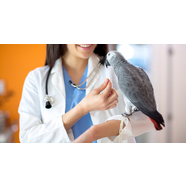Bird Health, Hygiene & Safety
Author: Amanda Date Posted:10 January 2016

HEALTH & PET BIRDS
Displaying any signs of illness is not beneficial to any bird. Instinctually it is important for a bird to hide any signs of illness in the wild. This has also transferred over into our companion birds. Many owners do not realise how sick their bird is until their illness can no longer be hidden. When this happens it means your bird has probably been sick for some time.
It is therefore important that your bird has yearly health checks with an avian veterinarian.
Regular worming is important to rid your bird of internal parasites such as roundworm, hookworm, caecal worm, thread worm, and tapeworm.
Products such as Vetafarm Wormout Gel, Avitrol Bird wormer in liquid or tablet form or Masterpet wormer for birds are all available.
HYGIENE
Infectious diseases can spread very easily via contaminated drinking water, droppings and feather dust.
In captivity birds rely on us to keep their environment clean. Ensure you wash their food and water bowls daily with warm soapy water. Stainless steel bowls are a good choice for food and water bowls and are easier to clean then some other dishes.

- Access to clean water should be available at all times.
- Cleaning your bird’s cage, perches and toys weekly with a safe bird cage cleaner suchas F10, Masterpet Cage Cleaneror Vetafarm Avicare is recommended.
- Discard any uneaten food to minimise bacteria growth and pests such as flies and insects.
- Pests can be controlled by using Vetafarm Avian Insect Liquidator in the aviary, cage, nest box or directly on your bird.
- Allow your bird the opportunity to bath to help maintain their plumage. Bird baths such as the Insight range of bird baths, or a flat dish are great for smaller birds. Polly’s shower and window perch is also a great way to allow your bird to bath. Misting your bird with a water bottle or mist setting on the hose also works well.

YOUR BIRD'S CAGE
This is probably the biggest consideration when housing your bird. No cage is too big! Your bird needs to have a cage that allows them enough room to move and spread their wings freely.
So the main factors to consider when housing your bird are:
- Size – the bigger the better.

- Shape – some cages make looking pretty, but are they practical for your bird?
- Bar spacing – ensure that your bird cannot get its head through and wedged in the bars of a cage. A combination of vertical and horizontal bars helps facilitate climbing. Bar spacing is also an important consideration when it comes to predators. Make sure the bar spacing is not too wide that snakes or wild birds can have access.
- Ease of maintenance – is it easy for you to clean and have access to their food and water bowls?
- Cage construction - any new cage made of galvanized iron needs to be thoroughly scrubbed with vinegar to prevent heavy metal poisoning. Wood cages are a poor choice due to their difficulty in cleaning and destructive birds chewing them. Choose a cage which is safe for your bird such as a powder coated or stainless steel cage
Other factors to consider are:
- Stress - Stress can play a role in the development of many diseases by lowering your bird’s immune system. It can occur from boredom, lack of sleep, cage placement, poor socialisation, poor daily routines, loneliness and punishment.
- Sleep – ensuring your bird has adequate sleep. Birds need more sleep than we do and need 10-12 hours of sleep a day. It’s important that if you are a night owl and stay awake late at night that you don’t keep them up also. Keeping them up by having lights or the TV on or waking them up early can lead to stress. Ensure you facilitate a good sleep routine for your bird. Ensure they are in a dark, quiet area so they have a restful, uninterrupted nights sleep. Many birds like a safe roosting spot
 and products such as Happy Huts, Polly’s Love nest and Superbird Tent can be used to provide this.
and products such as Happy Huts, Polly’s Love nest and Superbird Tent can be used to provide this. - Ceiling fans – If your bird is out of its cage, remember to turn all the ceiling fans off. If they were to fly into one it could lead to serious injury.
- Exposure to toxic fumes – such as smoke, cleaning fumes and teflon
- Escaping through windows or open doors
- Safety from predators – including snakes and hawks – ensure their cage is snake and predator proof if they are kept in an outdoor aviary. Predators can easily attack and kill your bird if the spacing on the bars of the cage are too wide and they have access to your pet.
- Being fed poisonous food – please refer to the nutrition information or your avian veterinarian for advice on what not to feed your bird
- Safe from being electrocuted, burnt or strangling – inspect your home for hazards.
- Drowning in the toilet – keep the seat down while your bird is out of it’s cage










